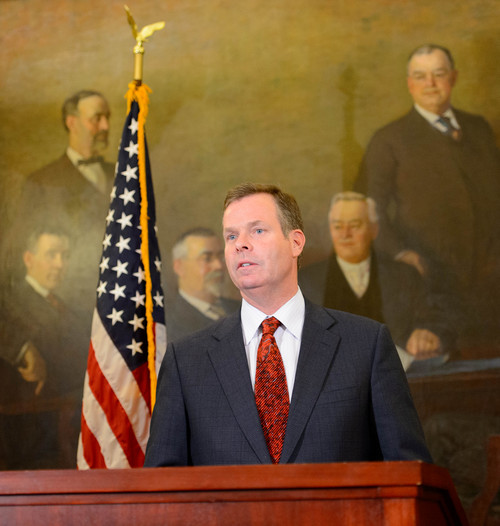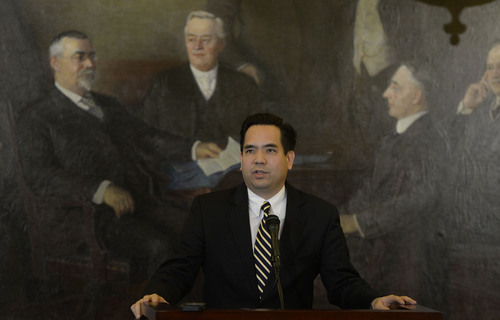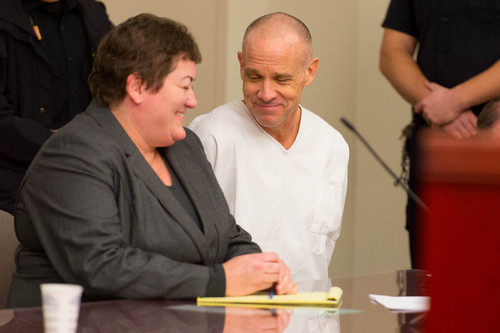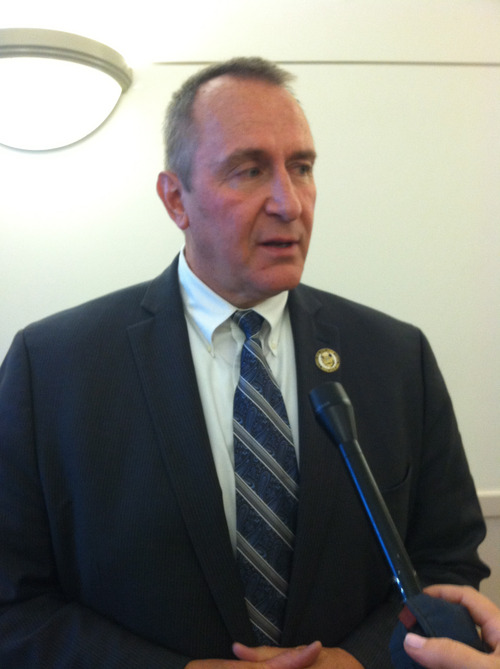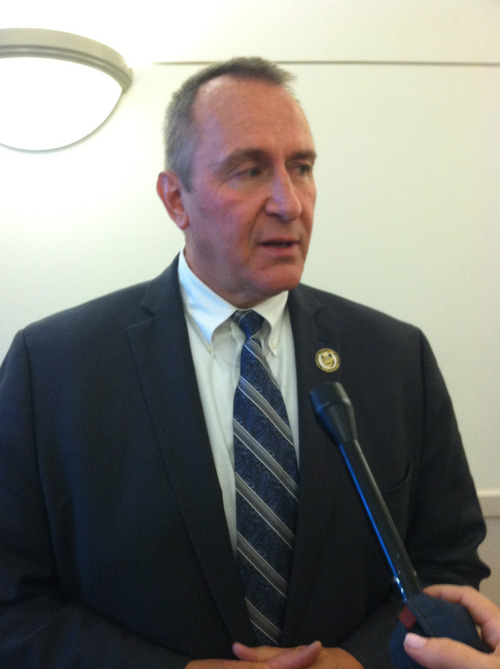This is an archived article that was published on sltrib.com in 2014, and information in the article may be outdated. It is provided only for personal research purposes and may not be reprinted.
Former Attorney General Mark Shurtleff's handling of the case against convicted fraudster Marc Jenson "defies explanation," according to a new report by a former federal judge and retired prosecutor.
But the misconduct was limited to Shurtleff and his successor, former Utah Attorney General John Swallow, the $140,000 report states, and shouldn't invalidate Jenson's conviction for securities violations or new charges he faces for allegedly defrauding investors in a southern Utah ski and golf resort.
Jenson's allegations of a politicized prosecution, a shakedown by Shurtleff and Swallow, and additional charges filed against him when he refused demands for more money have been key components of the scandal that drove Swallow from office in December.
New Attorney General Sean Reyes, who asked for the review in response to the allegations of impropriety, said Tuesday even though Jenson agreed to plead guilty to the securities charges, that "did not relieve our office from a duty to have conducted itself throughout the case in a fully ethical manner."
Reyes said it is up to Jenson's lawyers to decide what to do with the findings in the report by retired U.S. District Judge Paul Cassell and former acting U.S. Attorney Francis Wikstrom.
Cassell and Wikstrom said the state should not resist a court vetting of the alleged impropriety.
Jenson's attorney, Marcus Mumford, said he has been seeking a hearing to get to the bottom of what went on in Jenson's case — including likely calling Shurtleff and Swallow to testify — and he is glad the report recommends the state agree to such a hearing.
"We believe the attorney general's call for an evidentiary hearing, to have a public airing of these things, is the right call," Mumford said, "and it's what we've been asking for the entire time."
Mumford disagreed with the finding that Jenson wasn't harmed by the misconduct. He said the case against his client was spawned by complaints from political donors, coupled with shakedowns by Utah's past two attorneys general that led to Jenson being locked up when he ran out of money.
"To suggest," Mumford said, "that Mr. Jenson did not suffer a prejudice as a result of the actions of Mr. Swallow and Mr. Shurtleff against him defies credulity."
Shurtleff told The Salt Lake Tribune on Wednesday that his actions defied explanation only because he couldn't talk about them, due to an ongoing criminal investigation.
"After hearing my explanation a year ago, and comparing it to a felon's allegations, the Department of Justice ended its investigation," Shurtleff said. "What truly defies explanation is why the state spent more money on a one-sided, incomplete report that is based on the self-serving jailhouse lies of a convicted felon."
Shurtleff said he was pleased, however, that the report still found Jenson's plea and conviction were valid.
"I'm anxious for the day," Shurtleff said, "when I get to fully set the record straight."
The 65-page report, released Tuesday, paints a picture of criminal prosecutors and senior attorneys frustrated with Shurtleff's meddling in the Jenson case. Cassell and Wikstrom said it is difficult to comprehend why Shurtleff held private meetings with Jenson's attorneys and lobbyists and why he vacationed at Jenson's beachfront resort villa after Jenson had struck a plea deal with Shurtleff.
Shurtleff declined to answer questions for Cassell and Wikstrom and, as a result, the report said, it remains unknown why the former attorney general overruled prosecutors more familiar with the case and ordered a "sweetheart deal" for Jenson.
"As former prosecutors," Cassell and Wikstrom wrote, "we find his actions and decisions quite hard to understand or to rationalize."
At one point, the report notes, Shurtleff's chief deputy, Kirk Torgensen, and chief of investigations, Ken Wallentine, even wondered whether Shurtleff was a "spy," providing information directly to Jenson that would compromise the state's case.
Jenson was charged in 2005 with selling unlicensed securities. After back-channel communications, Shurtleff directed his criminal division chief, Scott Reed, to offer Jenson an informal plea-in-abeyance that would allow Jenson to avoid jail time. The judge initially rejected the deal as too lenient but approved it in May 2008 with restitution placed at $4.1 million.
Less than a year later, Shurtleff took the first of two trips to Jenson's luxurious villa at Pelican Hill near Newport Beach on Jenson's dime. Swallow also took junkets to the Southern California resort.
The report said Shurtleff had claimed that he rejected Jenson's offers of campaign donations and help getting a movie deal for a book Shurtleff wrote.
"But there is no justification whatsoever for Shurtleff to have had such interactions with Jenson," the report said. "Swallow's involvement also raises significant concerns, given his roles as fundraiser for Shurtleff and soon-to-be heir apparent."
Shortly after returning from Pelican Hill, the Utah attorney general's office began investigating another case involving Jenson, looking at whether he and his brother had cheated investors in the $3.5 billion Mount Holly ski and golf resort development planned near Beaver. Jenson, who had failed to pay restitution in his original plea, was sent back to jail.
Investigators monitored Jenson's conversations while in the Beaver County Jail and heard Jenson suggest he would pretend to have cancer to get the judge's sympathy. They also heard him discuss his close relationship with Swallow and Shurtleff, threatening to "bring that whole office down" if he wasn't released.
Jenson said Shurtleff owed him a favor because he helped fend off an investigation of Shurtleff by the then-U.S. attorney for Utah, who is related to one of Jenson's closest employees.
The report also refers to 2013 text exchanges in which Torgensen pressed Shurtleff on his involvement in the Jenson case and trips to Pelican Hill. Shurtleff texted that Jenson "got nothing but jailed and prosecuted." Shurtleff admitted he "made a stupid decision but did nothing illegal or unethical." Shurtleff apologized for his actions and the embarrassment that resulted.
The text messages appear to be the same ones Torgensen offered to the criminal probe, but those investigators wanted the full exchange. When Torgensen balked, they obtained a search warrant that allowed them to seize his phone in January.
Jenson's Mount Holly case has been turned over to a Utah County prosecutor after the attorney general's office stepped aside, due to the perceived conflict created by Shurtleff's actions. Jenson remains in the Davis County Jail.
Shurtleff, Swallow and others remain under criminal investigation by Salt Lake County District Attorney Sim Gill and Davis County Attorney Troy Rawlings.
Shurtleff told KSL Radio's "Doug Wright Show" on Wednesday that he is eager to answer any questions Gill and Rawlings have. He said he believes the two prosecutors will treat him fairly in their probe but added a warning.
"If I were to be charged," Shurtleff told Wright, "I'm going to win. They're going to lose. This is not something I'm going to lay down for. And I'm actually looking forward to it [answering prosecutors' questions]."
Twitter: @RobertGehrke


